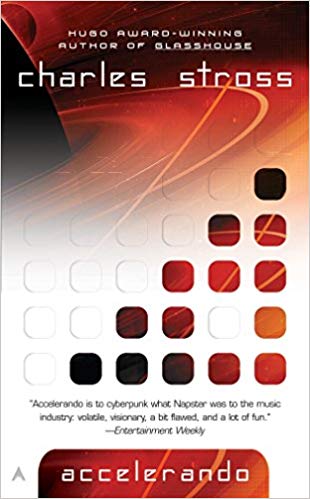Accelerando
We welcome Andrew Cruickshank to our #Scifi #AI series with his review of Charles Stross’ 2006 book, Accelerando that explores the notion of a singularity.
He highlights the challenge of noticing change and finding causality if change is constant and causality is beyond human comprehension.
Singularity stories are now a staple of science fiction, but Accelerando is a bit special in the genre because of its studied prosaic tone. Technology changes stop seeming weird very shortly after they start being used and withdraw into the background. Only the protagonist, choosing to live as a free and open idea conception engine, undergoes whole-of-future shock.
Stross works hard to illuminate how the background changes in a series of moments that are turning points that will change the future. Throughout, Stross is arguing that whatever life is, whatever mind is, more life and more mind are what they produce. Given that assumption, reduced to a set of bullets, the critical observations might be:
There many different pathways in nature;
The differences are often crucial to organisms, organisations and other self-sustaining systems;
The true value differences may not be searchable until they are explored (in a sense, enumerated) in competition and collaboration in an environment;
The more inclusive the competition (of both problems and techniques), the better the best solutions will be:
Hence, open competition (free markets), open solution methods (open source culture), open components;
The highest-value use of technology is very likely not what the inventor first thought of: giving away ideas will more effectively enrich you (and everyone else) than trying to patent them.
This search is readily understood as a very large computation being carried out with at least evolutionary increase of technique information; and
This is the search intelligently-governed capitalism has driven even in good conditions; war and survival motivate more of this same investment in finding ways to get better outcomes.
As time passes, knowledge accumulates, and the background efficiency rises until it is capable of more than satisfying every human need. More and more of the economy passes a ‘post-scarcity’ threshold. Love and money may not grow on trees, but everything else is produced with trivial human effort.
Post-scarcity, one of the most important sets of conditions for human life on earth to this point sinks below a perceptibility horizon.
Artificial intelligence beyond human capability become common, and more and more it would be computationally inelegant or vulgar for humans to be allowed anything more than autonomy if only because of the costs it would impose on the humans.
Accelerando is a ‘singularity’ story, choosing events and encounters in which the path to a singularity is made visible. In Stross’ understanding, that path is defined by a very expansive ethical recognition of the dignity of all thinking beings, and parts thereof; a relentless humbling for all existing thinking beings by the possibilities of the future; and an iron requirement to keep thinking the best consciousness of yourself possible.
The ‘rapture for nerds’ really does have echoes of Christianity and much of its argument would be recognisable to a reader of Hegel’s ‘Phenomenology of Spirit.’
Andrew Cruickshank is an operations analyst with the Defence Science and Technology Group.
The views expressed are his alone and do not reflect the opinion of the Defence Science and Technology Group, the Department of Defence or the Australian Government.
This article was first published by Central Blue on January 16, 2019.

